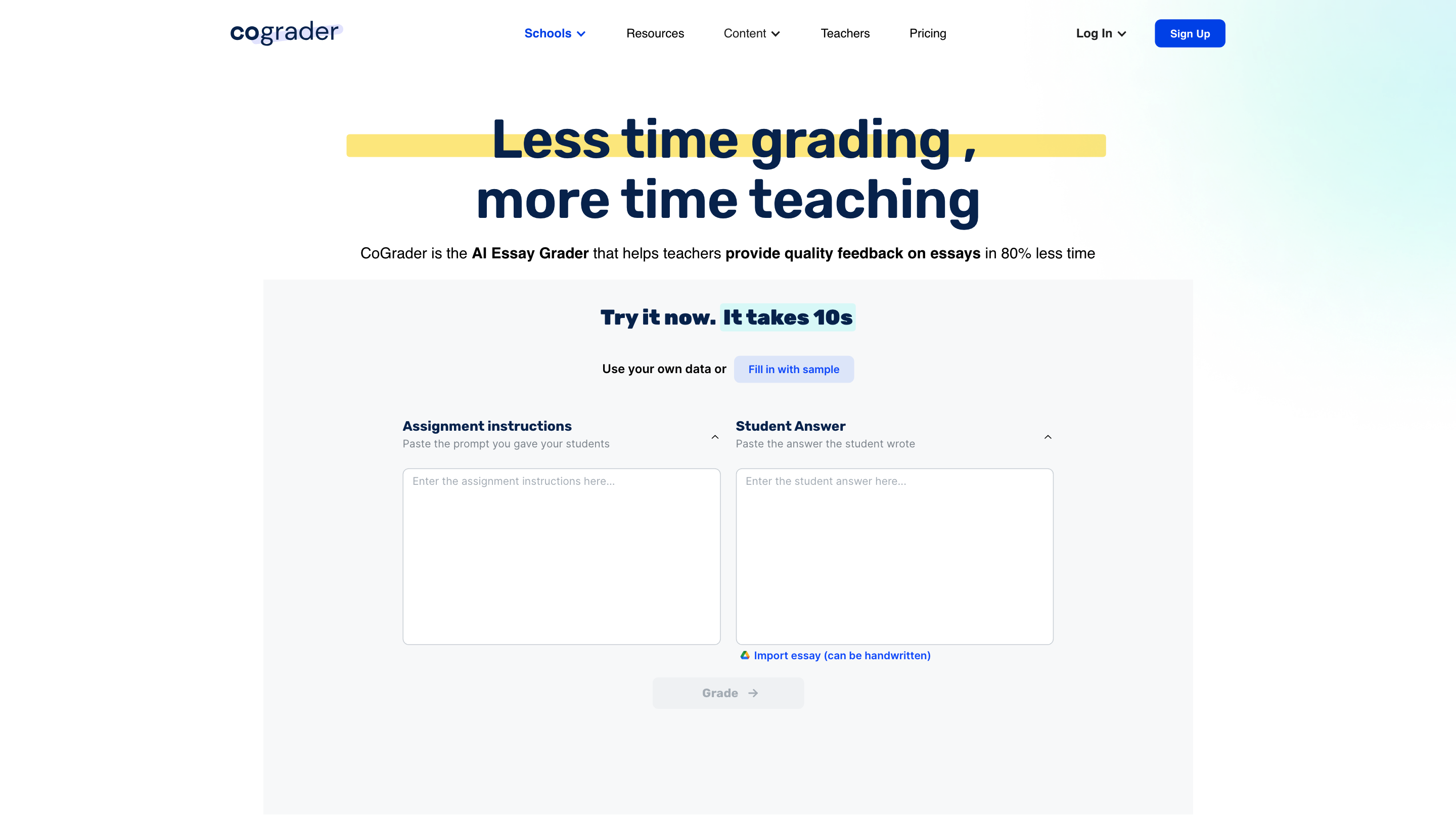CoGrader
Open siteIntroduction
AI tool for fast and accurate essay grading
CoGrader Product Information
CoGrader — AI Essay Grader is an AI-powered, rubric-based grading and feedback platform designed to help teachers assess essays more efficiently while maintaining high educational standards. It seamlessly integrates with Google Classroom and offers optional Canvas and Schoology support for districts, enabling quick import/export of assignments, AI-assisted feedback, and rubric-driven scoring aligned to state standards. The tool is built to save teachers time, reduce grading workload, and deliver specific, actionable feedback to students across multiple languages while preserving teacher oversight and control over final grades.
How it works
- Import assignments from your LMS (Google Classroom, Canvas, Schoology) or upload student work.
- Define grading criteria using preset state standards rubrics (CCSS, TEKS, Florida B.E.S.T., California Smarter Balanced, STAAR, New York Regents, AP/IB) or your own rubrics.
- CoGrader analyzes submissions and generates AI-driven feedback and grade suggestions with justification reports.
- Review, adjust scores and feedback as needed, then export back to your LMS or share with students. District users get aggregated analytics and progress tracking.
How to Use CoGrader
- Sign up for a trial or purchase a license for your school/district.
- Connect your LMS (Google Classroom, Canvas, Schoology) or upload assignments.
- Apply a rubric or standards-based criteria to assignments.
- Let CoGrader generate grades and detailed, personalized feedback.
- Review, modify as needed, and publish final grades/feedback to students.
Features
- Rubric-based AI grading that aligns with state standards (CCSS, TEKS, Florida B.E.S.T., California Smarter Balanced, STAAR, New York Regents, AP/IB)
- Google Classroom integration with one-click import/export; district options include Canvas and Schoology
- Supports multiple languages for assessment and feedback; interface remains English
- AI-generated, detailed feedback with evidence-based justifications to guide revision
- AI detection and integrity tools to flag potential cheating (where applicable)
- Privacy-first design: minimal data collection; data shared with AI models is anonymized; no student PII used for model training
- Flexible pricing for individuals, schools, and districts; PO/on-site licensing available for institutions
- Dashboards and analytics to monitor district or school-wide writing progress and identify gaps
- Ability to upload user-provided rubrics and training, plus custom rubric creation
- Compatibility with a variety of LMS file import/export formats and standards alignment
Integrations & Privacy
- Integrations: Google Classroom (primary), plus Canvas and Schoology for school/district accounts; import/export with Blackboard, Moodle, Microsoft Teams possible via file handling
- Privacy & security: SOC2 Type 1 compliance; FERPA compliance; OAuth2 authentication; anonymized student identifiers; data stored securely and encrypted
- Data handling: only essential assignment data and metadata collected; AI models receive anonymized submissions; no training with student PII
- AI transparency: AI-driven feedback and scoring are aids; final grades and feedback remain under teacher control
Safety & Best Practices
- Use for formative feedback and skill development; teacher reviews all AI-generated results before finalizing
- Use district/state rubrics to ensure consistency and fairness across submissions
- Be mindful of multilingual contexts; provide students with feedback in their language when appropriate
Core Benefits
- Significantly reduces grading time (up to 80%) while delivering targeted, actionable feedback
- Improves consistency and objectivity in scoring through rubric-based AI assessment
- Supports differentiated instruction by highlighting specific areas for improvement
- Maintains academic integrity with AI-detection capabilities and clear teacher oversight
Why educators choose CoGrader
Students receive timely, precise feedback to guide revisions; teachers gain time for instruction and personalized support; schools/districts benefit from standardized, scalable assessment and analytics.
